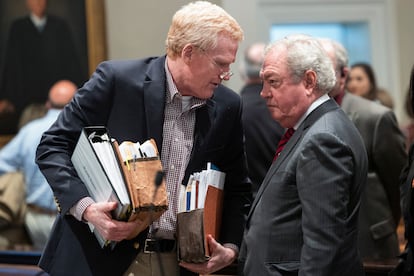Attorney: I trusted Alex Murdaugh despite odd fee payments
Attorney Chris Wilson said he had no reason to be suspicious when Murdaugh asked to have the $792,000 fee deposited directly into his account

A lawyer testifying in Alex Murdaugh’s double murder trial in South Carolina said he trusted Murdaugh even though the disgraced lawyer suggested an unusual way to split fees from a case the two had worked on together.
Attorney Chris Wilson said he had no reason to be suspicious when Murdaugh asked to have the $792,000 fee deposited directly into his account, rather than paying it directly to the Murdaugh family law firm. At the time, Murdaugh said his intention was to protect money because his son, Paul, was involved in a wrongful death lawsuit - even though the direct payment was a violation of the firm’s rules.
“I’d known him for 30-plus years. I didn’t have any reason not to trust him,” Wilson told the jury.
Wilson heeded Murdaugh’s request - but questions popped up after the June 2021 deaths of Murdaugh’s wife, 52-year-old Maggie, and Paul, who was 22. Murdaugh’s law firm demanded that Wilson send in $792,000, which he did - out of his own pocket. Murdaugh promised to pay Wilson back, but could only come up with $600,000.
Wilson said he had no choice but to loan his friend the remaining $192,000 and has never gotten that money back.
“I can’t tell somebody I’m holding money in my trust account that I’m not holding in my trust accounts,” Wilson said. “Trust accounts are money that belongs to someone else.”
Murdaugh, 54, faces 30 years to life in prison if convicted of murdering his wife and son. Prosecutors are arguing that Murdaugh killed them to get sympathy and buy time to hide a string of thefts. The defense says it makes no sense to think there wouldn’t be more scrutiny into Murdaugh’s life and finances after his wife and shot were shot to death.
The judge in the murder trial is allowing prosecutors to present a wide range of evidence that Murdaugh was stealing money from clients and his law firm.
Murdaugh faces nearly 100 other criminal charges unrelated to the killings, ranging from theft to running a money laundering and drug ring to tax evasion to fraud for trying to arrange his own death in a roadside shooting in September 2021 so his surviving son could get $10 million in life insurance.
Wilson was the 40th witness called in the trial, which began Jan. 23. He testified away from the jury last Thursday as the judge decided whether to allow financial misdeed evidence.
Wilson at times had to pause as he was asked about his friend he met in high school. Their wives were sorority sisters. Their kids grew up together. They spoke several times a week.
Wilson rushed the hour and 40 minutes to Murdaugh’s home as soon as he found out about the June 7, 2021, killings.
“I walked in, hugged his neck and cried. I didn’t know what to say,” Wilson said. “I didn’t want to know what he found. I didn’t want him to have to describe it to me.”
In cross-examination, the defense mostly asked Wilson personal questions, getting him to talk about how much he loved his family. Wilson said Murdaugh appeared to never stay at the family’s home after the killings and was staying with his brothers or in-laws every time he called.
“He was distraught. He was destroyed, upset all the time, not eating, not sleeping,” Wilson said.
Murdaugh’s family dominated the legal system in tiny Hampton County for generations, both as prosecutors and private attorneys.
Sign up for our weekly newsletter to get more English-language news coverage from EL PAÍS USA Edition
Tu suscripción se está usando en otro dispositivo
¿Quieres añadir otro usuario a tu suscripción?
Si continúas leyendo en este dispositivo, no se podrá leer en el otro.
FlechaTu suscripción se está usando en otro dispositivo y solo puedes acceder a EL PAÍS desde un dispositivo a la vez.
Si quieres compartir tu cuenta, cambia tu suscripción a la modalidad Premium, así podrás añadir otro usuario. Cada uno accederá con su propia cuenta de email, lo que os permitirá personalizar vuestra experiencia en EL PAÍS.
¿Tienes una suscripción de empresa? Accede aquí para contratar más cuentas.
En el caso de no saber quién está usando tu cuenta, te recomendamos cambiar tu contraseña aquí.
Si decides continuar compartiendo tu cuenta, este mensaje se mostrará en tu dispositivo y en el de la otra persona que está usando tu cuenta de forma indefinida, afectando a tu experiencia de lectura. Puedes consultar aquí los términos y condiciones de la suscripción digital.








































